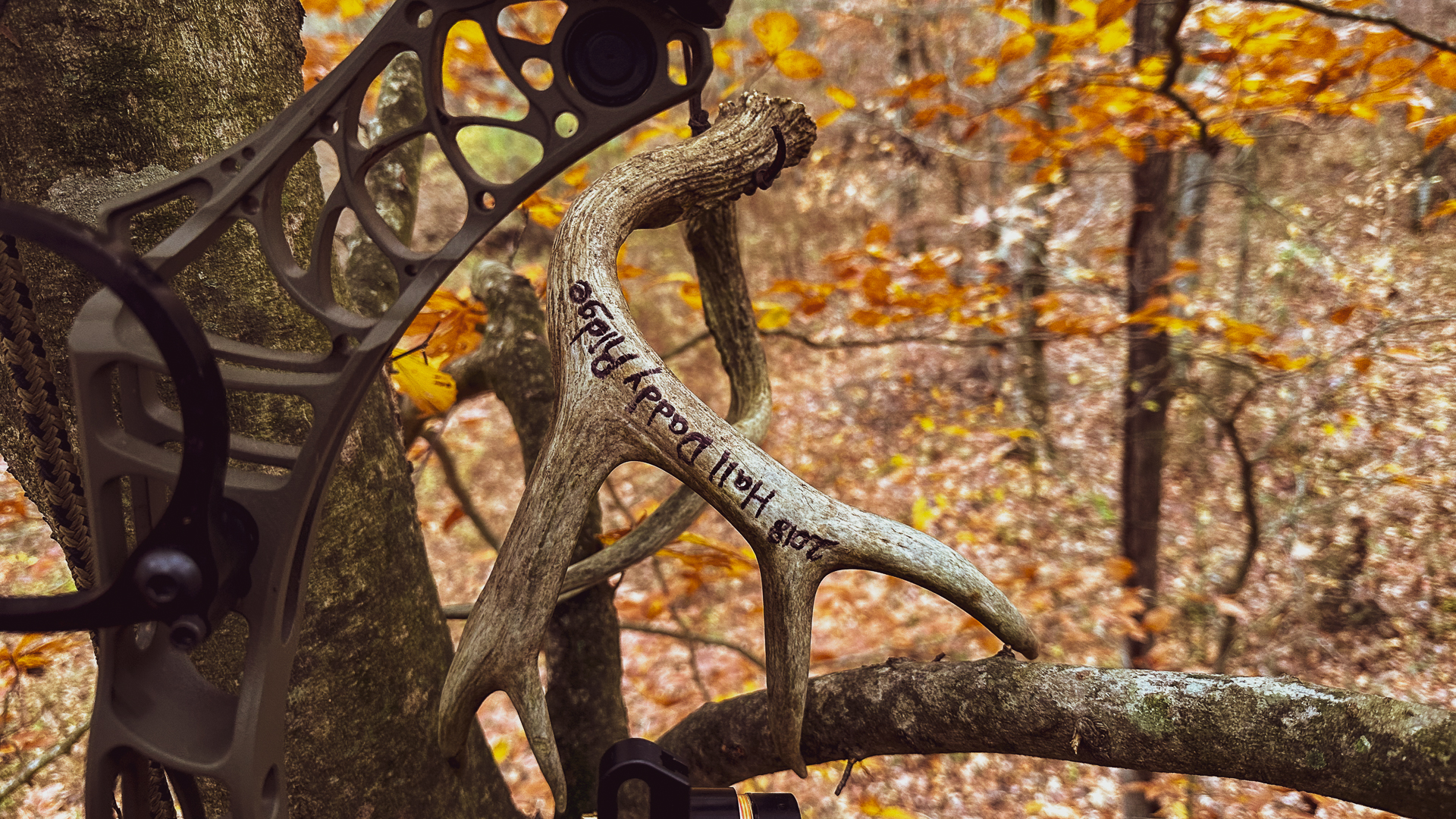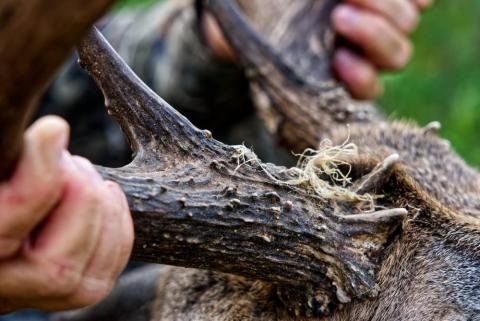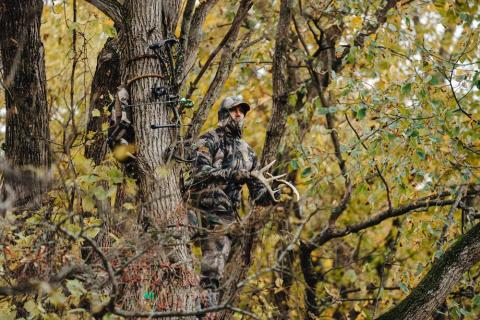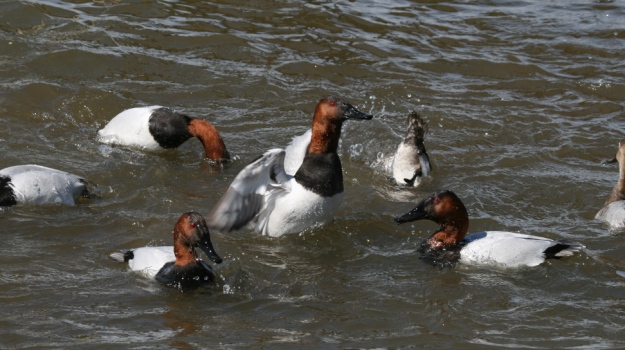
Editor’s Note: Mike Still, of Judsonia, Arkansas, has been hunting ducks for over 40 years and has been a member of the Mossy Oak Pro Staff for 7 years. Somewhat surprisingly we learned his favorite pattern is the original Bottomland camo for hunting waterfowl. “The reason I like Bottomland is because I primarily hunt flooded timber, and Bottomland looks more like a tree trunk, especially when I’m standing in the shadow of a tree, than a real tree trunk looks,” Still explains. The good news is the forecast for duck season this year is that there will be plenty of ducks coming down the flyways.
Sometimes I’m asked, “Do you allow other hunters to call when you’re calling?” I tell them, “Yes, I do.” Whether I’m guiding on private lands or hunting with friends on public lands, I like to have the hunters I’m hunting with also call. If I’m hunting with a group of guys I know are very-capable callers, I’ll definitely encourage them to blow their duck calls. I believe that the more birds you can sound like talking on the water, the more birds you can call down from the air. If I have a hunter who doesn’t know how to call ducks effectively, I’m glad to give him some pointers while we’re standing in the water, waiting on ducks, to help him become a better caller. If all I can get that man to blow: tick, tick, tick, tick, quack, tick, tick, tick, tick, quack, then I’ll encourage him to blow his call when we’re working ducks. Now I don’t know how other duck hunters feel, but I believe everyone who calls ducks has one species of ducks that’s difficult for him to call. For me that duck is the gadwall. I don’t know why that duck is so tough for me to call. I think when gadwalls see your decoys, they make up their minds as to whether they’re going to come in or not come in, and when I blow my call to those ducks, if they act like they are not coming in, I can’t seem to change their minds. I don’t know why. That’s the one duck that I hate to see fly over my blind. The easiest duck for me to call is the mallard.
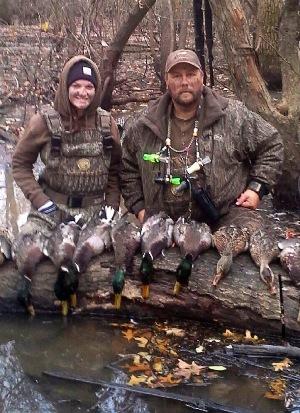 On public lands in Arkansas, 90 percent of the ducks I’ll call in will be mallards. Now when I say I hunt on public lands, I’m not just hunting on WMAs, I’m also hunting rivers. Unlike many public-land hunters, I usually don’t use a blind on my boat. I’d rather get out in the water and stand next to a tree. If I have to hunt out of my boat, I like to pull my boat into a brush top or a tree top and put out some camo netting to break-up the outline of the boat. If I have to hunt in deep water, I don’t think you can build a blind that will look any better than my boat looks with camo netting on it. We’re not seeing as many ducks now as we’ve seen in the past in Arkansas. I think that’s mainly because the North isn’t getting the severe weather it once did. But the other reason is that duck hunters in Tennessee, Ohio and Illinois have learned how to manage the ducks on their hunting clubs. They’re keeping water open for them in the later part of the year and planting more feed for the ducks than they have in the past. Then the ducks don’t have to come as far down on the flyway as they once have to find food and open water.
On public lands in Arkansas, 90 percent of the ducks I’ll call in will be mallards. Now when I say I hunt on public lands, I’m not just hunting on WMAs, I’m also hunting rivers. Unlike many public-land hunters, I usually don’t use a blind on my boat. I’d rather get out in the water and stand next to a tree. If I have to hunt out of my boat, I like to pull my boat into a brush top or a tree top and put out some camo netting to break-up the outline of the boat. If I have to hunt in deep water, I don’t think you can build a blind that will look any better than my boat looks with camo netting on it. We’re not seeing as many ducks now as we’ve seen in the past in Arkansas. I think that’s mainly because the North isn’t getting the severe weather it once did. But the other reason is that duck hunters in Tennessee, Ohio and Illinois have learned how to manage the ducks on their hunting clubs. They’re keeping water open for them in the later part of the year and planting more feed for the ducks than they have in the past. Then the ducks don’t have to come as far down on the flyway as they once have to find food and open water.
That’s the bad news, but the good news is, because of the warm weather, we’re often getting ducks coming back from Louisiana earlier than they once did. Also, when Arkansas has really-cold weather, and a warm front comes through, we’ll get ducks returning earlier than usual from Louisiana and the Gulf Coast that we can hunt. I’m also convinced that many times we get ducks coming back from northern Arkansas to southern Arkansas. I stay in touch with a lot of duck hunters throughout the state of Arkansas, and I know that when our ducks leave northern Arkansas, then southern Arkansas has more ducks, and when they don’t have ducks in southern Arkansas, we’ll have ducks in northern Arkansas. When a cold front moves in, I know that the ducks we have in northern Arkansas will move to southern Arkansas. I also know that when we get a warm front coming from the south, the ducks in southern Arkansas will come up here to northern Arkansas.
I have duck-hunting friends all over the state, and we check with each other to see who has ducks and who doesn’t have ducks, especially when we hear about storm fronts moving through the state. I also have friends in Louisiana. During a warm front from the south coming in, they’ll lose their ducks. We’ll often get their ducks in north Arkansas. I try and stay in touch with the ducks’ migration the best I can, and I think that’s a major secret that lets you know what kind of duck hunting you should have every morning you go out to hunt. Also when we’ve got a clear, cold night with a full moon, we tend to get more ducks migrating down the Mississippi flyway than we do on a dark night with little or no moon. Major cold fronts coming in from up north will also bring us lots of ducks.
To learn more about hunting, check out John E. Phillips’ new eBook and print book, “Bowhunting Deer: Mossy Oak Pros Know Bucks and Bows.” You also can download a free Kindle app that enables you to read the book on your iPad, computer or Smartphone.




















